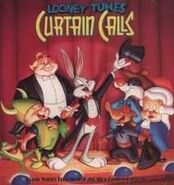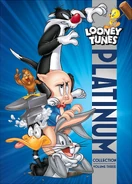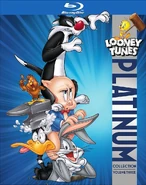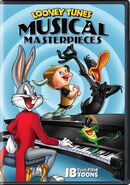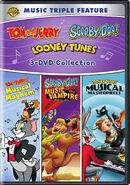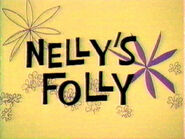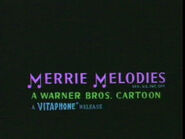Nelly's Folly is a 1961 Merrie Melodies short directed by Chuck Jones and co-directed by Maurice Noble and Abe Levitow.
Plot[]
Africa is dark and terrifying amid jungle sounds and roars. From the darkest area, comes the melodious sound of singing. A singing giraffe named Nelly is performing for her animal friends, singing "Voices Of Spring" by Johann Strauss. A hunter appears from out of the bush, and exclaims, "I wouldn't have believed it if I hadn't heard it with me own eyes!" and immediately has her sign a contract offering her fame and fortune.
Nelly waves a tearful goodbye to her friends in the jungle as she leaves for civilization, captivated by the idea of show business. Once she arrives in New York City, she is put to work singing jingles for "Algonquin Rutabaga Tonic", a cure for ailments, puts on live stage shows, and produces a line of giraffe-neck sweaters, effectively making turtleneck sweaters go out of fashion.
Over time, Nelly becomes lonely with fame and longs for male companionship. One day, she wanders into the zoo and falls in love with a male giraffe, but she finds out he's already married, albeit unhappily, as the "wife" catches him looking at her. Scandal ensues, and her agent begs her to break off the affair for the sake of her career. After a disastrous opera opening, rumors of her being a homewrecker, and her agent only able to get her roles in foreign films before ditching her entirely, Nelly returns to the zoo to be with the giraffe with whom she flirted, only to find him snuggling with his wife and wanting nothing to do with her. Devastated over her ruined career and reputation, Nelly returns to Africa to live out the rest of her life in obscurity.
As the dejected and lonesome Nelly sings a beautiful love song, tears drip from her eyes, and from the eyes of her sad jungle friends, into her sad reflection in a pond. Moments later, another male giraffe begins singing along with her. The two fall in love, and Nelly is finally happy.
Availability[]
The Looney Tunes Video Show Volume 19
Looney Tunes Curtain Calls: Classic Music and Show Business Cartoons
Warner Bros. Home Entertainment Academy Awards Animation Collection, Disc 3
Looney Tunes Platinum Collection: Volume 3, Disc Two
Looney Tunes Platinum Collection: Volume 3, Disc Two
Looney Tunes Musical Masterpieces
Music Triple Feature
Notes[]
- This short is unusual among other Looney Tunes and Merrie Melodies cartoons of the time, as it is not classified as a comedy. Instead, it is more of a musical drama.
- The magazine "Wife" is a parody of "Life" and features giraffe neck sweaters. A turtle peruses this photo spread and sadly remarks, "That's show business!" which is a spoof on the decline of turtleneck garments at the time.
- Nelly's "scandal" which was brought in as the result of her illicit affair with the male giraffe from the zoo is a direct reference to Ingrid Bergman, who was shunned by American audiences in 1950 for her (at the time) scandalous affair with married director Roberto Rossellini. Bergman spent most of the 1950s away from the United States, marrying Rossellini in 1950 before divorcing him in 1957. After winning an Oscar in 1957 for Anastasia (1956), the scandal was largely forgiven by the public.
- This film was nominated for an Academy Award in 1962, for Best Short Subject, Cartoons.
- Gloria Wood sang the original "Rice-A-Roni, The San Francisco Treat" TV jingle. She was also the vocalist for Kay Kayser's "The Woody Woodpecker Song" and was dubbed the singing voice of Marilyn Monroe, Vera Ellen, and Betty Grable.
- One of the songs Nelly sings in this cartoon is "The Flower of Gower Gulch", which was previously sung by Porky Pig in the opening credits of "Drip-Along Daffy" ten years earlier, albeit without Porky's signature stutter.
- "Nelly's Folly" did not end with the familiar "That's all Folks!" title card, but rather, with a slide that read: "Merrie Melodies: A Warner Bros. Cartoon. A Vitaphone Release". These words appeared in purple, green, and blue, respectively, against a black background.
- When this cartoon was released on Looney Tunes: Curtain Calls LaserDisc release in 1993, this aforementioned slide is cut, ending straight after the "THE END" title card, for unknown reasons, presumably due to time constraints.[2][3] Other home media releases, such as the Warner Bros. Home Entertainment Academy Awards Animation Collection DVD, as well as TV airings, kept this aforementioned ending card intact.
Music[]
- "Auld Lang Syne"
- "The Flower of Gower Gulch", written by Michael Maltese
- "Voices of Spring", by Johann Strauss
- "Aloha Oe", by Queen Liliuokalani
- "Columbia, Gem of the Ocean", aka "The Red, White and Blue"
- "Then You'll Remember Me", from Balfe's opera "The Bohemian Girl"
Gallery[]
TV Title Cards[]
References[]
- ↑ (3 October 2022) Cartoon Voices of the Golden Age, Vol. 2 (in en). BearManor Media, page 201.
- ↑ https://archive.org/details/looney-tunes-curtain-calls/Curtain+Calls-+Side+1.avi
- ↑ https://chomikuj.pl/SSNN/*e2*96*ac*e2*96*ac*e2*96*ac*e2*96*ac*e2*96*ac*e2*96*ac*e2*96*ac*e2*96*ac*e2*96*ac*e2*96*ac*e2*96*ac*e2*96*ac+*e2*97*84*e2*9d*b6*e2*96*ba+Bajki+*e2*97*84*e2*9d*b6*e2*96*ba/*e2*96*ac*e2*96*ac*e2*96*ac*e2*96*ac*e2*96*ac*e2*96*ac*e2*96*ac*e2*96*ac*e2*96*ac*e2*96*ac*e2*96*ac+*e2*97*95+Zwariowane+Melodie/Wersje+Angielskie/Rok+1961/123061+Nelly*27s+Folly+MM,1989615265.mpg(video)


